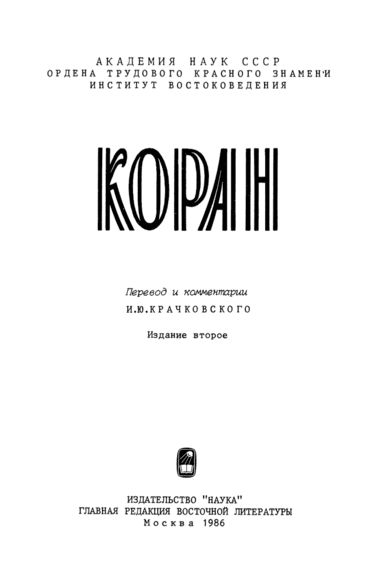While we typically explore Qur’an translations authored by Muslims, today we delve into the intriguing transformations and faith-based usage of a renowned Orientalist Qur’an translation in Russian. The famous Russian Arabist Ignatii Krachkovskii (1883–1951), known in the academic world for establishing the Soviet school of Arabic studies and for his prolific publication record, is mostly recognized by the wider public for his Qur’an translation, which was published posthumously in 1963.

This work became one of the main religious resources used by late-Soviet and post-Soviet Muslims during the final years of the USSR and the first decade after its collapse. Krachkovskii often emphasized the significance of philology as the predominant tool in the methodological toolbox of Western Orientalists at the time. The philological approach is evident in his published work on Arabic poetry and prose of diverse historical periods. Already an established academic in pre-revolutionary Russia, Krachkovskii continued his scholarly pursuits within the newly configured USSR in the 1920s. During this second period of his career, he engaged in translating the Qur’an as part of his university teaching duties. He insisted on regarding the Qur’an as a ‘literary monument,’ a stance that stemmed from the belief that philological exploration into its historical context could unveil insights into its authenticity, origin, and chronology—the core elements of the course he taught on the Qur’an. The application of a philological approach, with its attendant tools and methods, was still deemed the most suitable methodology by Krachkovskii, despite the changing state ideological framework within which his teaching and research was situated. In the new Soviet context, the ‘literary monument’ trope served a dual function: it secularized the sacred text, divorcing it from its religious meanings and connotations, while also enabling the study of the religious text somewhat independently of the Marxist paradigm. His translation was thus conceived as an endeavor that aimed to discover the Russian equivalents for the ‘original’ meanings of the Qur’anic words that emerged from seventh-century Arabia without relying on the Islamic exegetical tradition.
Any analysis of its literary merit would not do justice to Krachkovskii’s translation, as his work was not completed in his own lifetime. However, it is fair to say that the underlying epistemological stance and perception of translation through the prism of ‘philological accuracy’ situate Krachkovskii’s Qur’an translation firmly in the Western Orientalist tradition, with which he was often in critical dialogue. It is essential to note that he himself did not attempt to publish his Qur’an translation, due to the challenges this presented under the Soviet regime, particularly in terms of the censorship involved in the publication of religious texts during the Stalinist period. Even when these texts were viewed as ‘literary monuments,’ such a task was an unfeasible undertaking during Krachkovskii’s lifetime. Only twelve years after Krachkovskii’s passing, with the death of Stalin, did the editorial team publish his drafts in the form of an academic translation.
The editorial team that prepared Krachkovskii’s drafts for publication decided to implement only minimal changes. Thus, the overly-literal style of Krachkovskii’s original rendition was preserved in the first edition, and also in the following editions and reprints. Many aspects of this translation remained influential in subsequent decades, including, but not limited to, Krachkovskii’s translatorial choices relating to vocabulary, the academic authority of this work, and its trans-national influences, as well as Krachkovskii’s opinions from the commentaries, all of which appear in various subsequent Qur’an translations even beyond Russian. However, in this post we are particularly interested in demonstrating the paratextual metamorphoses that Krachkovskii’s Qur’an translation underwent with the collapse of the USSR, and how the religious revival of that period influenced the reappropriation of Krachkovskii’s Qur’an translation by Muslim believers.
Due to the late-Soviet process of liberalization and the rise of private publishers towards the end of the 1980s, a boom in Krachkovskii reprints occurred in 1990 across various USSR locales from Kharkov (Ukraine) to Dushanbe (Tajikistan). The academic credentials of the translator meant that his work was seen as much more reliable than previous translations that dated back to the Russian Empire, and thus more suitable for reprinting. The assumed ‘value of neutrality’ in Krachkovskii’s translation appealed to a newly-emerged, religiously-motivated readership who often prioritized it over other, older works. However, publishers did not simply produce exact reprints of the early, academic editions of this translation. Many of Krachkovskii’s original academic references, as well as some potentially offensive statements and assumptions about the Qur’an, which reflected widespread ideas that could be found in many late nineteenth- and early twentieth-century Orientalist writings, were deleted from the reprints. This strategic removal of the paratextual materials included in the academic editions clearly served the aim of ‘purifying’ the translation and making it uncontroversial, thus shifting its intended audience from an academic to a confessional readership, and recasting it as a religious text.

These attempts to ‘Islamize’ Krachkovskii’s translation took place in the 1990s in various forms in different editions, but all editions are consistent in their erasure of Krachkovskii’s commentary and other paratextual materials. Another important change implemented by the various publishers of Krachkovskii’s translation was their addition of decorated book covers. Often, the covers featured a particular aesthetic, and were adorned with various decorations that resemble those found on the Arabic musḥaf.

These changes breathed new life into Krachkovskii’s Qur’an translation, as the academic edition underwent a transformation and became ‘Islamized’ and, due to the lack of any Muslim-authored full Qur’an translation into Russian, these editions of Krachkovskii’s work now became an integral part of the religious bookshelves of many Muslim families. The publisher-driven changes to the original, influenced by late Soviet commercialisation, allowed Krachkovskii’s translation to fill a market niche during the transitional period surrounding the collapse of the Soviet Union, and set the stage for the emerging trend of Muslim-authored Qur’an translations that would dominate the market in subsequent years.
Elvira Kulieva
